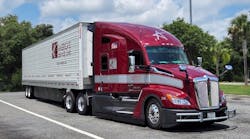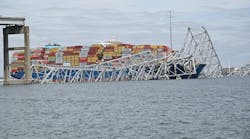WASHINGTON D.C. – Andreas Renschler, head of the global truck division for Germany’s Daimler AG, isn’t wearing rose-colored glasses when he looks at the present and future state of the global trucking market.
“The outlook – especially for the U.S. market – is clear: we’re in for a rough ride,” Renschler noted during an informal luncheon with reporters at the Hay Adams hotel in Washington D.C. “The financial crisis that started here in the U.S. has now spread to the rest of the world. So we are preparing ourselves for a downturn by becoming more efficient. That should help us grow through this crisis.”
In both prepared and extemporaneous remarks, Renschler noted that there’s a mix of both good and bad economic signals for truck makers. On the negative side of the ledger, U.S. consumer spending is set to decline to levels unseen in nearly 30 years, business investment is falling even deeper, and U.S. GDP [gross domestic product] has been revised down significantly.
“If the U.S. economy loses just one percentage point of growth, the result is nearly $140 billion per year less in goods and services generated,” he said. “And that also means lower demand for transport.”
Given these harsh economic headwinds, Renschler said it’s not surprising that 80% of all truckload carriers indicate they will ramp up their purchase levels of trucks in advance of the 2010 emission regulations. “As a consequence, our sales dropped 24% in the first 10 months of this year in the U.S. and the market recovery we expected in the NAFTA [North American Free Trade Agreement] region has been put on hold,” he pointed out.
However, there are good signals, too, Renschler stressed. “Inflation is down, oil prices are down, and raw material prices are getting a little weaker,” he said. “Also, we in the truck business are used to up and down cycles – we know how to deal with them.”
Preparing for the down cycle is why Daimler decided in October to shut down its Sterling Trucks subsidiary, he explained. “Originally, we had forecast a pre-buy in 2009 similar to 2006; that is why we went ahead with Sterling product development plans,” Renschler noted, pointing out the introduction of the NightShift sleeper cab tractor, aimed at LTL fleets, earlier this year.
“The forecast was very clear – then it radically changed,” he said. “The market restructured downward, with a lot of owner-operators leaving the business. So we needed to adopt a new position.” Now, Daimler expects Class 5-7 truck demand to remain flat in 2009 with only a gradual recovery in 2010, with Class 8 trucks experiencing only a modest rebound in the next two years.
“A return to the record levels of 2006 is unlikely,” Renschler said. “But as a result of restructuring our Daimler Trucks North America division, we will have a production network with a much better balance between cost, capacity, and market need. We’re not just focusing on ‘rear guard’ actions. We’re seeking to gain market share in the long run.”




